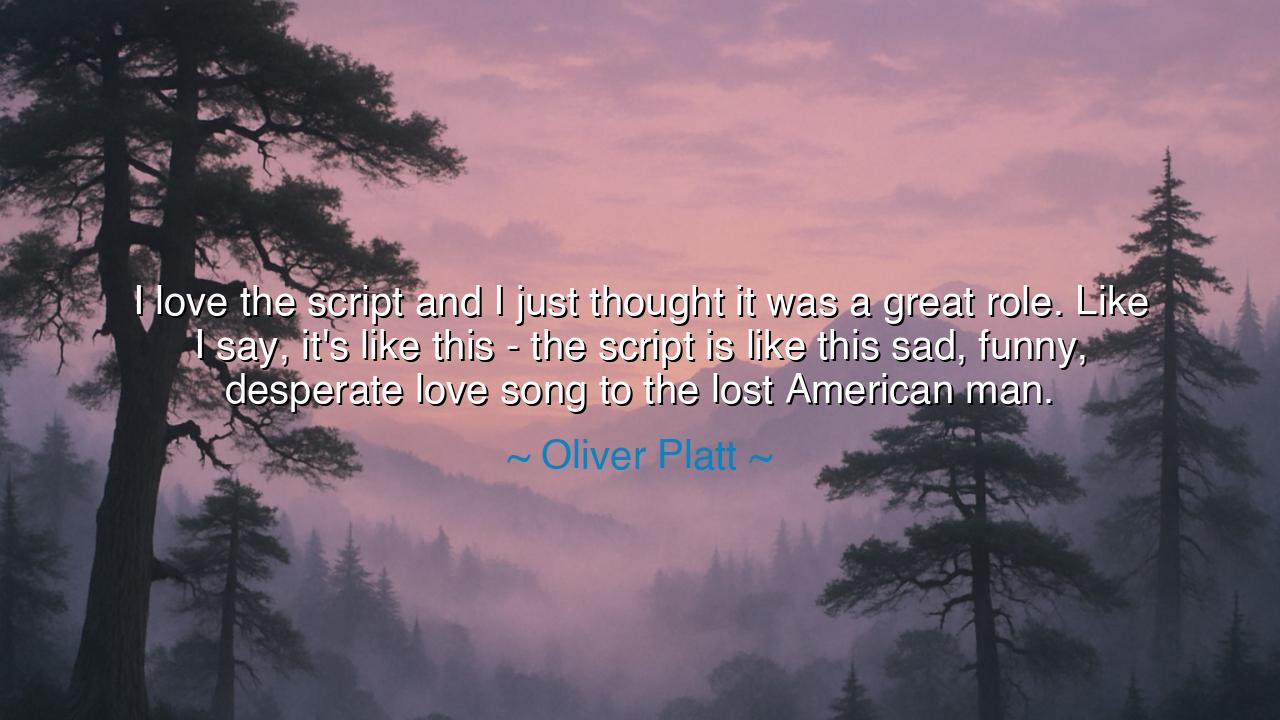
I love the script and I just thought it was a great role. Like I
I love the script and I just thought it was a great role. Like I say, it's like this - the script is like this sad, funny, desperate love song to the lost American man.






There are stories that touch the soul not through grandeur, but through their intimate portrayal of human longing, loss, and humor. Oliver Platt, reflecting on a role he cherished, said, “I love the script and I just thought it was a great role. Like I say, it's like this - the script is like this sad, funny, desperate love song to the lost American man.” In these words lies the essence of storytelling: the power to capture the complex interplay of sorrow, wit, and yearning that defines human existence. Platt’s insight reminds us that the heart of art is empathy, and the ability to illuminate lives both ordinary and extraordinary.
Platt describes the script as a “sad, funny, desperate love song,” a combination of tones that mirrors life itself. Ancient philosophers, from Aristotle to Seneca, recognized that tragedy and comedy are intertwined, that the human condition is both sorrowful and absurd. The lost American man, in Platt’s description, embodies this duality: yearning for purpose, love, and understanding, yet caught in circumstance, folly, or melancholy. Art, he suggests, gives voice to these tensions, allowing audiences to see themselves reflected and their experiences validated.
The “lost American man” can be seen as a symbol of existential struggle and societal displacement. Throughout history, literature and theater have explored the alienation of individuals within changing societies. Consider Arthur Miller’s Willy Loman in Death of a Salesman, a character both tragic and comic, whose dreams, failures, and yearning for recognition mirror Platt’s description. Like Loman, Platt’s character embodies the universal tension between aspiration and limitation, comedy and pathos, personal desire and societal expectation.
Platt’s words reveal the actor’s intimate relationship with the material. He does not merely perform the role; he resonates with its emotional core. Ancient Greek actors similarly recognized that to embody a character authentically, one must engage not only the body, but the spirit and empathy. Platt’s appreciation of the script as a “love song” underscores that art is an act of devotion: to honor the complexity of life, to convey humor and sorrow together, and to connect audience and story in a shared human experience.
There is also a lesson in narrative empathy. The script’s capacity to reflect the lost man’s inner world allows audiences to encounter lives unlike their own, fostering understanding, compassion, and reflection. In the Roman tradition, playwrights like Plautus and Terence used comedy to explore social dynamics, human folly, and moral dilemmas, blending laughter with reflection. Platt’s recognition of the script’s dual tones continues this lineage: stories illuminate both the light and shadow within every human experience.
History provides numerous examples of works that serve as emotional mirrors. Consider Charles Dickens, whose novels often portray society’s marginalized, blending humor and tragedy to reveal the condition of the human soul. In David Copperfield or Great Expectations, readers laugh at folly while weeping for injustice, encountering both the sadness and resilience of life. Platt’s “sad, funny, desperate love song” functions similarly: it captures complexity and invites audiences to feel deeply, laugh, and reflect simultaneously.
The universal lesson in Platt’s words is clear: embrace the fullness of human emotion in art and life. Sadness and comedy coexist, despair and hope intertwine, and empathy is the bridge that connects observer and observed. By recognizing the layers of experience in others, we cultivate understanding, insight, and compassion, both as artists and as human beings.
Thus, let Oliver Platt’s reflection guide us: honor the stories that capture the human condition in all its contradictions. Celebrate the interplay of sorrow and humor, and allow yourself to resonate with lives both familiar and distant. In doing so, we participate in the timeless endeavor of storytelling, using narrative to illuminate, console, and inspire. The “sad, funny, desperate love song” reminds us that art exists to reflect life in its richest, most authentic complexity.






AAdministratorAdministrator
Welcome, honored guests. Please leave a comment, we will respond soon